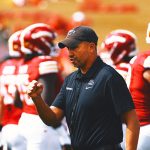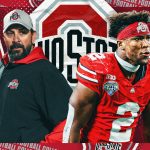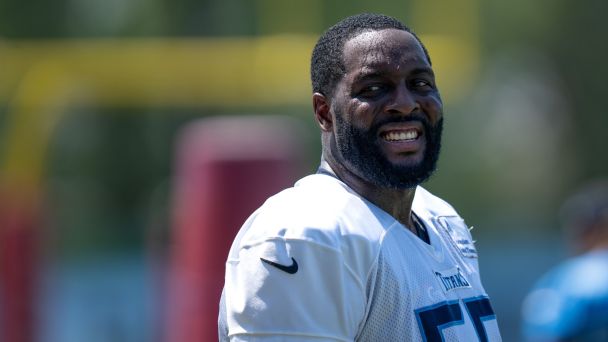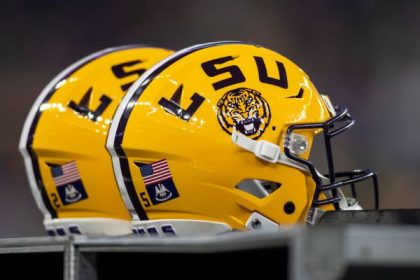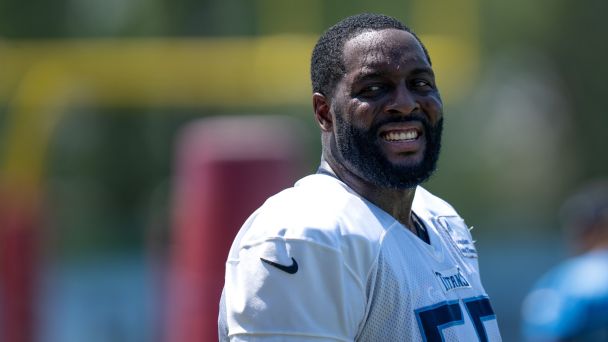
NASHVILLE, Tenn. — For players in the NFL, signing a multimillion-dollar contract is one of the marquee signs of success. For Tennessee Titans right tackle Chris Hubbard, that moment finally came in 2018, when he signed a five-year, $36.5 million deal with the Cleveland Browns at the age of 26.
But the pressure he experienced off the football field because of it was nothing he had anticipated.
“I’m from the east side of Columbus, Georgia, man,” Hubbard said. “I ain’t never experienced that amount of pressure, never seen that type of money ever in my life. We lived check to check [growing up], tried to scrape up whatever we could to make ends meet.”
With his new contract, Hubbard felt the need to help everyone, and he was soon fielding requests to help relatives, some he had never met, with money.
“They were coming out of the woodworks,” he said.
The pressure of dealing with the responsibilities that came with financial success was so overwhelming that he contemplated quitting football.
As a result, Hubbard was “all over the place mentally.” He lost 20 pounds. His calm, welcoming demeanor soured, causing him to have a different attitude toward people.
Hubbard started going to counseling to learn coping mechanisms that would help him get back on track. He also talked to his uncles, Ed King, who played for the New Orleans Saints, and Brentson Buckner, who played for the Carolina Panthers and Pittsburgh Steelers, to try to figure things out.
Buckner praised his nephew and told him how others could look at him for motivation to do the same.
“You’re not doing it for yourself, you’re doing it for somebody after you,” Buckner told him.
That was the direction Hubbard needed as he dealt with all the financial requests he was fielding.
“A lot of trials and tribulation, man,” Hubbard said. “It took me probably like two years after all that stuff happened, I started to seek therapy and everything, and I started to feel like myself again.”
Hubbard met with a counselor on the Browns’ staff to help with the pressure he felt from signing the high-value contract. Cleveland was ahead of the curve in that it employed a team therapist before the NFL instituted a support system in 2019 for players to seek help with their mental health.
“Back then when I was playing, it was almost taboo to speak of [mental health issues] because we was considered these big, physical human beings and nothing can hurt us,” Buckner said. “Now guys are more open to speaking about it and realizing it is a problem for anybody whether you’re an athlete or not.”
Hubbard first recognized the importance of mental health in high school. One of his close friends died by suicide, which later inspired him to use his platform to advocate for mental health.
“He felt like he couldn’t handle everything … by himself,” Hubbard said. “So that’s one of my reasons why I wanted to bring awareness towards it.”
Hubbard used his personal experience and platform to promote mental health awareness, especially during September, which is National Suicide Prevention Month.
During his freshman year in 2009 at UAB, tragedy struck again when he received a call one month into the season telling him his best friend, his grandfather, had died from prostate cancer.
“I struggled really hard, man, with that because he really taught me a lot about life and how to carry myself as a man and what I should stand on,” Hubbard said.
Hubbard found himself in a dark place. He wasn’t paying attention in class and ended up on academic probation. He wasn’t getting enough sleep, and he turned to alcohol to cope with the pain.
During that time, Hubbard decided to take a short break and went back to Columbus to be around family. That was when Hubbard was first exposed to the value of talking through things instead of trying to work through them on his own.
“I now know who I need to talk to,” Hubbard said. “To somebody like a therapist or just talk to someone to get it off my chest, man.”
In this case, Hubbard turned to his mother, Angela Jones, who reminded him that UAB gave him a scholarship because the program believed in him.
“I told him he had a choice,” Jones said. “Either come back where there was nothing for him in Columbus or change his mindset and make a name for himself.”
She also stressed that Hubbard needed to get himself together and go back to school to serve his purpose.
“That just motivated me to take it to the next level, dive deep,” Hubbard said. “To really just push myself to the limits.”
Hubbard is now in his 11th season in the NFL with 52 starts under his belt — including three with Tennessee (1-2).
Hubbard signed a one-year deal with the Titans three days after training camp started as a free agent and has become the veteran in the offensive line room. Coach Mike Vrabel called Hubbard a “great addition” and said he has “great respect for how he came in and earned a position.”
Hubbard now also works with the National Alliance on Mental Illness, which raises awareness and provides support and education to communities across the country.
He has spoken to students at his former school (George Washington Carver High School) in Columbus, done many interviews on the topic and used the NFL’s “My Cause, My Cleats” initiative to call attention to mental health.
“Chris always has great energy,” right guard Daniel Brunskill said. “Always helping out young guys. He’s a great leader and does a great job of bringing the same energy every day. He always comes into the building with a smile, and it starts there.”

